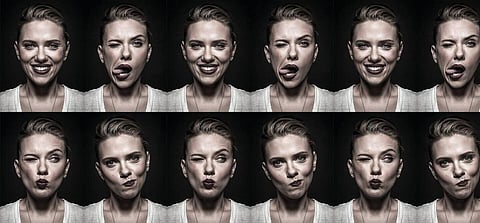
- Home
- न्यूजग्राम
- NewsGram USA
- India
- World
- Politics
- Entertainment
- Culture
- Lifestyle
- Economy
- Sports
- Sp. Coverage
- Misc.
- NewsGram Exclusive
- Jobs / Internships

Washington DC, June 13, 2017: It is well established that facial expressions help us by indicating the mood of a person, even when the person is not up for a conversation. But a new study has shown how facial expressions can cause difficulties when it comes to telling unfamiliar faces apart.
According to the study published in the journal i-Perception, people's faces change from moment to moment. Even over the course of a conversation with someone, if noticed well, clear changes in their expressions and in the angle of their head can be spotted.
Even time causes further significant changes in appearance, such as facial hair, changes in hairstyle or weight loss. But despite these changes, it is not difficult for us to recognise someone we know. In case of unfamiliar faces, the story is different. It is proven by numerous studies that we are generally not so good at matching together two pictures of the same face.
It still remains unknown how our visual system manages to overcome the challenge of facial changes, and helps us to recognise people even with the changed appearance.
The participants learned the identities of two actors from naturalistic (so-called 'ambient') face images taken from movies using an identification task. The training was conducted either with neutral images or their expressive counterparts. Perceived expressiveness had been experimentally determined.
Expressive training responses were slower than neutral training responses, more erroneous too.
According to ANI reports, Neutrally trained participants gave slower and less accurate responses to images of high compared to low expressiveness when tested with novel images of the actors that varied in expressiveness. It is clearly demonstrated by these findings that facial expressions intervene in the processing and learning of facial identity.
This dependence on expression is consistent with a two part model of face processing in which variable facial aspects and identity are coded in a common framework. It is thus suggestive of the fact that expressions are a part of facial identity representation.
According to lead researcher Annabelle Redfern from the School of Experimental Psychology, "Our approach was to use several hundred pictures of faces taken from movies, which meant that the images in these experiments resemble the sorts of faces that we see every day. We measured people's reaction times and their accuracy at telling unfamiliar faces apart, and how this differed when the faces were very expressive compared to when they had a neutral expression."
Redfern also mentioned that the differences that have been found point to the idea that our brains so not treat facial expressions and facial identity separately. Instead, we are more likely to mentally store someone's expressions along with their faces.
– prepared by Durba Mandal of NewsGram. Twitter: @dubumerang
